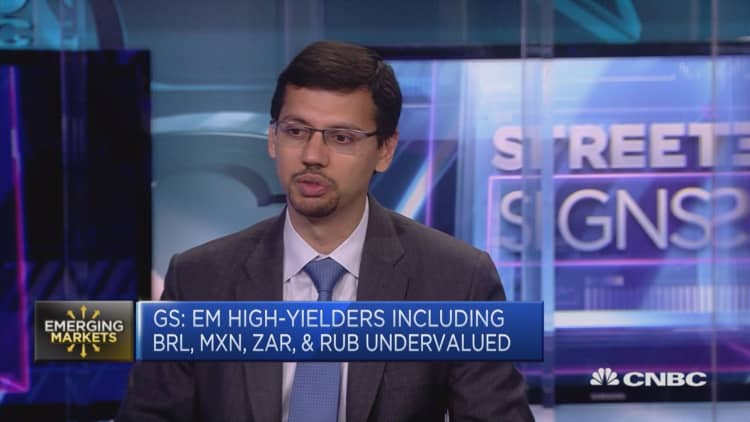Brazil's upcoming presidential election is widely expected to be its most polarized vote since returning to democracy three decades ago.
The country's most popular politician is in jail, while the current frontrunner is recovering from a near-fatal stabbing.
Voters in Latin America's largest economy have witnessed an unprecedented corruption scandal in the run-up to Sunday's vote, with a record number of Brazil's political representatives facing criminal cases.
The scandal has exacerbated widespread distrust among the Brazilian electorate, with just days to go before what many consider to be the most important vote in the country's history.
CNBC takes a look at all you need to know ahead of the first-round ballot on Sunday.
Who is running?
Brazilian voters will choose between 13 presidential candidates, five of whom could plausibly secure enough votes in first round voting.
But, if — as most external observers expect — no candidate wins a majority this weekend, the top two vote winners will face each other in a run-off vote on October 28.
One person not running for re-election is former President Luiz Inacio Lula da Silva. The leftist icon was imprisoned in a corruption scandal in April, subsequently becoming ineligible to seek a return to public office.
In Lula's absence, former military officer and far-right candidate Jair Bolsonaro is leading the race to become Brazil's next commander-in-chief. Behind him, according to the latest opinion polls, is far-left candidate Fernando Haddad, a former Sao Paolo mayor who has taken the baton from Lula as the Workers' Party (PT) candidate.
Trailing Bolsonaro and Haddad are a trio of presidential candidates — Ciro Gomes, Geraldo Alckmin and Marina Silva. All three lawmakers have sought to present themselves as centrists with ambitions to unite the country, although none are expected to catch the frontrunners before Sunday.
Who will win?
Bolsonaro maintains a significant lead over Haddad ahead of Sunday's ballot, according to a Brazilian Institute of Public Opinion and Statistics (Ibope) poll published Wednesday.
In a simulated first-round vote, the Ibope poll showed 32 percent of voters were prepared to support Bolsonaro, while Haddad came in at around 23 percent. The two candidates are seen running practically neck-and-neck in a second run-off vote later this month.
"The race is too close to call, but we think Fernando Haddad looks likely to eek our a narrow victory in the second round," Per Hammarlund, chief emerging markets strategist at SEB, told CNBC via email.
In a sign of just how polarized the vote in Brazil has become, a Datafolha opinion poll published Tuesday found almost half of the electorate would never consider supporting Bolsonaro. The far-right candidate — who has been dubbed by some as the "Trump of the Tropics" — has angered many with misogynist and racist comments throughout the campaign.
Meanwhile, according to the same opinion poll, the rejection rate for Haddad is at 42 percent.
Why does this vote matter?
Brazil is reeling from a massive corruption scandal, with nearly half of voters suggesting they would never support the current frontrunner and more than 40 percent saying they would not consider supporting the second-most popular candidate.
It comes at a time when Brazil's unemployment rate is in double-digits and its fragile economy is gradually picking up steam. And, according to opinion polls, voters in the Latin American country are looking to elect an experienced and competent president to change things for the better.
Bolsonaro, who is seen as the more market-friendly candidate despite previously admitting ignorance over a range of economic issues, has thrived by claiming to be a clean-living lawmaker determined to drain the political swamp.
Meanwhile, Bolsanro's most likely challenger in a second-round run-off vote, Haddad, is promising a return to the days when, under Lula's premiership, Brazil enjoyed eight years of economic boom from 2003 to 2011.

"If the market can get comfortable with a candidate that is going to address the longer term fiscal challenges, I think you could have more upside in the Brazilian real," Kamakshya Trivedi, co-head of FX and emerging markets research at Goldman Sachs, told CNBC's "Street Signs" on Wednesday.
Brazil's real stood at around 3.9012 versus the U.S. dollar on Thursday. Goldman Sachs expects the South American currency to strengthen to 3.8000 against the greenback over the next three months.
What happens after the vote?
Regardless of who wins the Brazilian election, the country's next president will be hard-pressed to unite a bitterly divided nation.
"The materialization of (a financial) risk is likely to happen after the election, if Brazilian voters elect an outsider from the right or left that refuses to undertake the fiscal adjustment that the country needs," Carlos Caicedo, senior principal analyst for Latin America at IHS Markit, a London-based research firm, told CNBC via email.
"Under such a scenario markets are likely to lose confidence in Brazil, undermining the country's credit outlook and exacerbating currency depreciation," he added.


